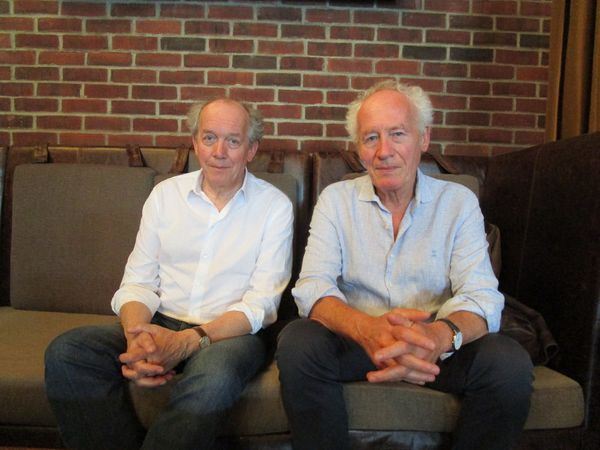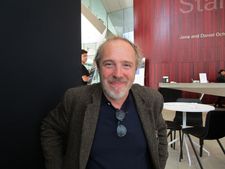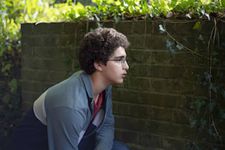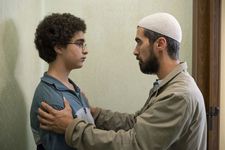 |
| Luc Dardenne and Jean-Pierre Dardenne, Cannes Film Festival Best Director winners for Young Ahmed (Le Jeune Ahmed) Photo: Anne-Katrin Titze |
Jean-Pierre Dardenne and Luc Dardenne joined me for a conversation at Ian Schrager's Hudson Hotel the day after the North American Premiere of Young Ahmed (Le Jeune Ahmed) at the New York Film Festival. The film stars Idir Ben Addi as Ahmed with Myriem Akheddiou, Victoria Bluck, Claire Bodson, Othmane Moumen, Olivier Bonnaud, and Cyra Lassman.
Marion Cotillard's walk turned her into a reluctant Western hero in Two Days, One Night. Here, Young Ahmed (Idir Ben Addi), an adolescent boy, living in a small Belgian town, suddenly grows distant from his surroundings. His body is changing and out of control and so are his thoughts. The words of the local Imam (Othmane Moumen) and the video of a cousin who died a martyr's death inspire his radical thoughts.
 |
| Jean-Pierre Dardenne and Luc Dardenne are distributors of Arnaud Desplechin's Roubaix, Une Lumière (Oh Mercy!) in Belgium Photo: Anne-Katrin Titze |
Not just radical in the sense that he refuses to shake hands with his female teacher (Myriem Akheddiou), that nothing at all is to interrupt his prayer routine, that he wants his mother (Claire Bodson) and sister (Cyra Lassman) to wear a hijab and shun alcohol, no, Ahmed goes further. When the Imam casually calls his teacher an apostate for wanting to include secular Arabic lessons in her syllabus, Ahmed hatches a ferocious plan.
With Young Ahmed, the Dardennes enter a new realm of their oeuvre, namely that of religious fanaticism. And yet their latest film, for which they won the top director prize at Cannes, is very much in line with what they do best. They illuminate seemingly impossible situations that are deeply grounded in social realities. Body language, quotidian objects, a hesitant glance speak volumes.
When I met with Arnaud Desplechin for a coffee inside the cafe of Alice Tully Hall at Lincoln Center the day before, he told me that Jean-Pierre and Luc were going to distribute his latest film Roubaix, Une Lumière (Oh Mercy!) in Belgium.
Anne-Katrin Titze: I had coffee with Arnaud Desplechin yesterday and we were talking about his film Oh, Mercy! and the character Sara Forestier is playing and Ahmed came up in the context of the extreme unwell-being in their body. And how important that aspect is for both films.
 |
| Luc Dardenne on Idir Ben Addi as Ahmed: “We wanted to put the viewer in front of a body of a child that in a way can't possibly do what it's going to do and yet he does do it.” |
Luc Dardenne: Sara Forestier is a young woman and Ahmed is just a boy. He's at the beginning of adolescence. And that's a time when your body is going through modifications anyhow, hormonal changes. So it's an age where a new being is starting to appear but the first being is not yet dead.
It's complicated, it's difficult. It's also the time in life when we start to idealise and we look for models outside the family, whether they're professors or someone else. And that's the point where Ahmed finds himself.
AKT: What you say about the past being not yet dead - he walks like a toddler.
LD: Exactly. And that's partly why we chose that actor, Idir Ben Addi to play Ahmed. He has this body that's still the body of a child. He doesn't walk right, he still has kind of a big bottom, his hands are puffy, he has baby cheeks.
He is in this child's body but his behaviour and discourse are contrary to that child's body. He's already an adult but he's still in a child's body and so we thought this was a very interesting dramatic crux to kind of put in place.
 |
| Ahmed (Idir Ben Addi) in the classroom with his teacher Mme Inès (Myriem Akheddiou) |
We wanted to put the viewer in front of a body of a child that in a way can't possibly do what it's going to do and yet he does do it. He attacks his professor [Mme Inès played by Myriem Akheddiou]. So we wanted to place the viewer in this kind of double view situation of seeing he can't possibly do it and yet he does do it. Which also underlines the ability that fanaticism has to capture one's mind.
AKT: I took notes while watching the film, writing no, no, no, no, he is not going to do what I think he is going to do. It puts us in the audience in a very interesting position because we know something that the people inside the film do not know. At least, we have reason to suspect a little more. We become almost a little bit guilty at his side?
Jean-Pierre Dardenne: Guilty isn't the word that I would use. But it is true that in this film viewers accompany this boy in his fanaticism. At times they pull away and at others they want to protect him, like when viewers are writing "No, no, no, no."
 |
| Ahmed (Idir Ben Addi) with Imam Youssouf (Othmane Moumen) |
In any case they try and take this journey with him. Which also means that he's a person. He's not a figure. He's not a character. We tried to have the viewer accompany a person, not a character, not someone who impostures. And that's what we always try to avoid, is to have characters.
AKT: You succeeded.
JPD: What we tried to do was to find how to get this boy who is plunged into this darkness, into this night, how to get him out of that. And the only way we found was to have him fall, to have his body break. And to go back to your first question - that's the subject of the film. It's Ahmed's body. This body that has been trained by religion. This body that keeps its distance with things. This body that purifies itself.
LD: If I could just add, when you say that the viewer is a little bit ahead of the characters, I think we could say that they share in Ahmed's secret. And what we also thought is that we wanted the viewer to say or to think that it's impossible to prevent this kid from wanting to kill the apostate. When we were conceiving the character, he escaped us.
We never managed to find a solution, as my brother was saying, to get him out of fanaticism. We wanted the viewer to say to him or herself, seeing for instance when he's sharpening the toothbrush: No, I can't believe it, I thought that he was out of it. But no, he's going right back to fanaticism. You know, it's a terrible mystery, it's an enigma. And there's no easy therapy to cure him.
The New York Film Festival runs through October 13.
Young Ahmed is screening at the French Film Festival UK in November and December





















